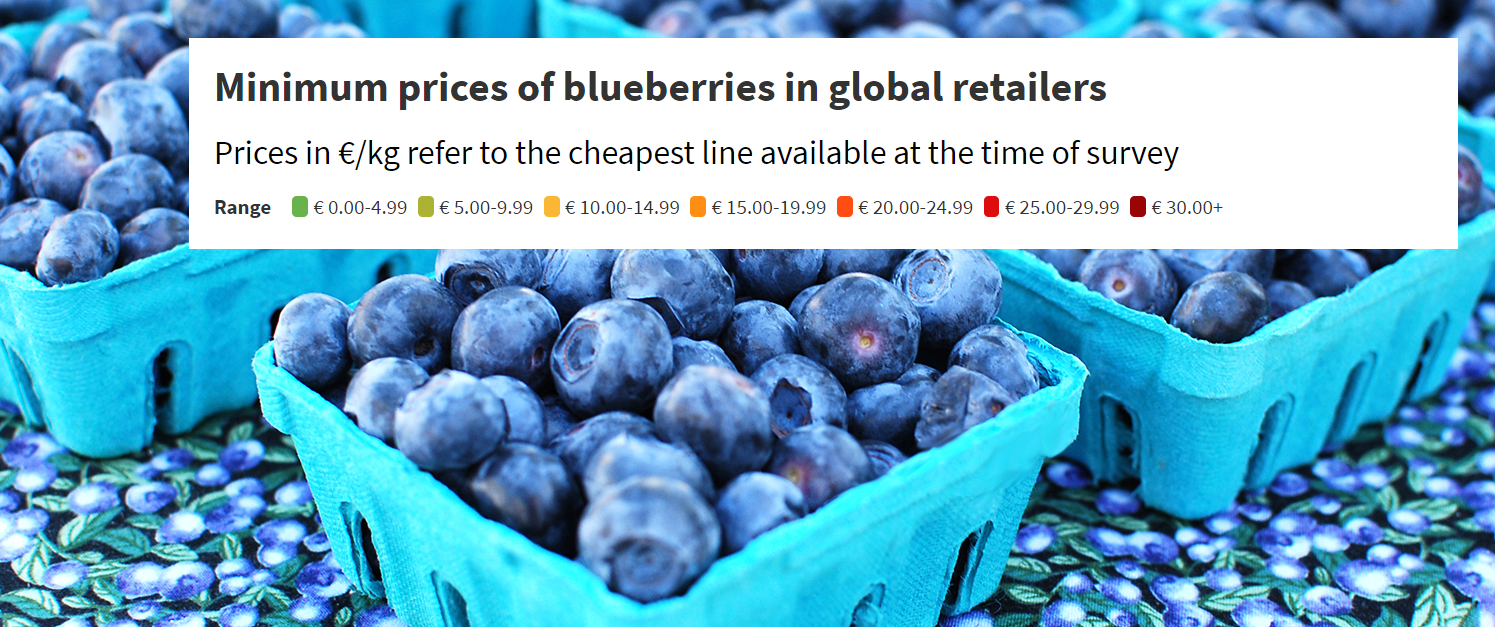The economic importance of the blueberry supply chain in Piedmont, which has steadily grown in recent years due in part to the relevant results, also brings with it the critical issues that are now common to all global production of blueberries: the market, labor and climate change.
The season of blueberry piedmont 2023 is therefore full of critical issues. In every aspect of the production chain, difficulties and pitfalls are increasingly pushing companies toward innovation and adaptation of working methods.
MARKET
The harvest period, which tends to be 3 to 5 weeks, is increasingly compressed by foreign market pressures, with production from countries such as Morocco, Spain close behind the Italian season, followed by Poland with the risk of a pincer effect. Emiliano Albertengo, owner of Azienda Agricola Albertengo in Revello, spoke on this subject:
"From the meetings we had at Fruit Logistica, the outlook does not look so promising: in fact, it seems that the quality standard required will increase; this means that there will potentially be interest in picking up only the first few cuttings. The problem, however, is not so much quality either, but competition with productions that are fighting with much lower prices." "We have purchased a processing machine and we have cold rooms-we are investing to be competitive. The window is very narrow and countries like Poland and Spain work very well."
"At the level of prices we can't give anything for certain yet, probably we will start from last year's prices, but I think we should expect a war on the bottom. So we are not talking about quality level, but we are talking about competition with competitors. Below a certain threshold we are not comfortable harvesting, so at the margin level it becomes complex. That is precisely why we try to limit the cutoffs. Of Duke we talk about three cuttings, as for Draper two if you prune aggressively."
Roberto Coppa, producer and packer of blueberries from Careglio Farm in Saluzzo, Italy, also commented on the same topic:
"It is necessary to work very well in that short time frame, our window is 3-4 weeks. We are actually not so much concerned about the quality of the product, but the main issue is not to get customers or markets stolen. To prevent any cost problems, for example, I have started pruning plants more consistently to amortize harvesting costs and be more competitive. If we start to think that the market price will drop further, it will no longer be possible to make back the expenses."
"The paradox is that everyone has the knife between their teeth; the general desire is to lower spending. Even supermarkets, due to budget issues, demand an increase in quality by lowering purchase prices: but this seems quite difficult to me," Coppa says. "All this always considering that the supermarket space for products is always the same. In this regard, I don't agree with the 125g format at all. We don' t sell plastic and logistics, we sell fruit. The packaging and logistics costs of 8x125g will not be sustainable in the future. Larger formats, on the other hand, will be more sustainable and also meet the needs of producers."
"In my opinion, it's a matter of educating the customer," Alex Brondino, producer of Soc. Agricola Brondino F.lli S.S., also says in this regard. "Packaging, at the end of the day, you pay the same, regardless of the amount of product. But it is also true that, at the end of the day, the supermarket still wants to sell the 125g. It will all depend on who has the will to bear the cost."
MANPOWER
Another problem that seems to be difficult to solve is that of manpower, not in terms of the cost issue, but in terms of availability: "We have already started applying for workers," says Emiliano Albertengo, "and for now we do not have a large number of people, but we have to start at this time otherwise we risk arriving at harvest time without staff. As far as we are concerned, on 4 hectares we need at least 25 people."
"The cost of labor is always the same. The problem is finding it," says Alex Brondino. "We believe that this time it will be necessary to turn to cooperatives, but even then it is a jackpot. As far as we are concerned, with other crops besides blueberries we are able to maintain operators for longer periods than a single harvest year. In addition, this establishes a closer relationship with the staff that can last for several years."
"We have a farmhouse with several bedrooms, kitchen, bathrooms. We are equipped for employees to stay for free. If they are comfortable, they are more likely to stay. We always try to talk to the employees, and in this way we create a direct dialogue and agree on the duration, timing and modalities of the work."
"We have about 10 employees who have been working with us since 2016. I think it is normal to expect staff turnover, for a variety of reasons, but I must say that most of them stay with us."
CLIMATE
One of the concerns of many Piedmont producers in the early part of the winter season was the weather. It seems, however, that the situation has now settled down:
"Atthe climatic level there have not been too many problems, we can talk about a fairly mild winter," says Roberto Coppa, "It does not specifically concern me who is in the foothills, in fact in our area we should not run into drought problems compared to other regions. We will still have to deal with rain. For example, Chile had big problems this year because of rainfall, but in that case, unfortunately, it is impossible to know. Here in the province of Cuneo you can't even cover since most of the plants are on the ground; but even with the covers in case of heavy rains the plants are damaged."

For Alex Brondino, the situation also seems to have quieted down: "So far there have been no problems with rain, we have seen clement weather for now. Finally, snow has arrived in recent weeks, so we are confident that for the summer there will be no problems." Albertengo also reassures that "the water supply has arrived, 70-80 cm of snow has finally arrived in the mountains, the concern has decreased a lot."
The cultivation of blueberries in Piedmont represent the largest part of the Italian blueberry supply chain, with a total of more than 650 hectares of cultivated land, most of it in the province of Cuneo, which accounts for 80 percent of the region's cultivation. There have also been increases in area in the province of Turin in recent years, which already had a total of more than 90 hectares used for production in 2021.

All rights reserved - Italian Berry - CC BY License







